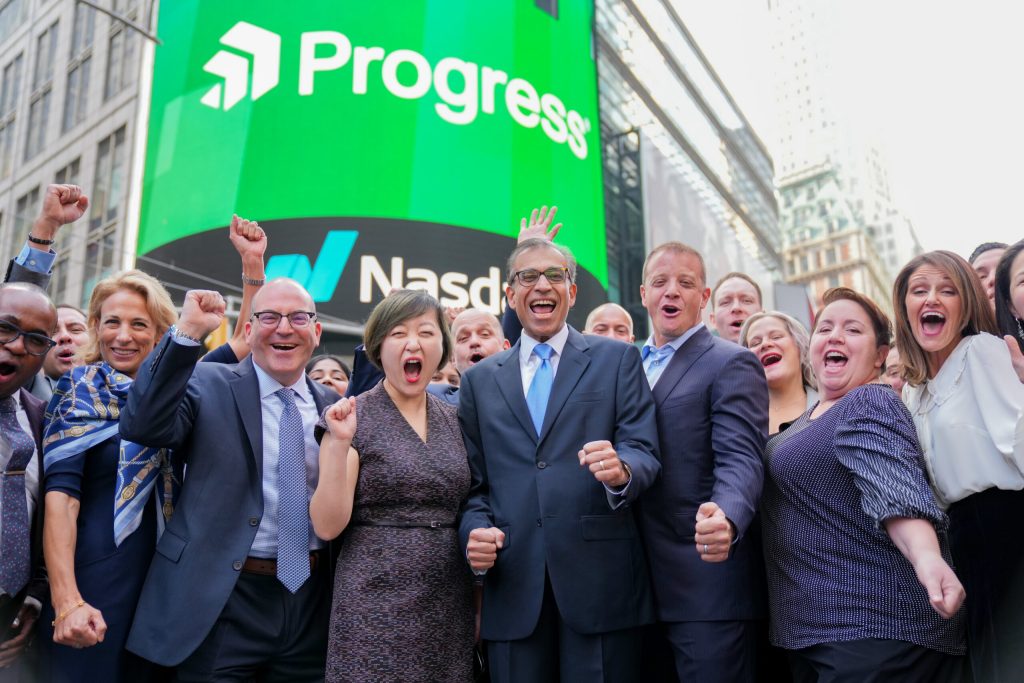Progress, an organization that has been around for over 40 years, had two of its best years ever in 2021 and 2022 immediately following the COVID-19 pandemic the year before. How was the organization able to rebound so quickly? According to President and CEO Yogesh Gupta, it all comes down to people and how they are treated.
Gupta, who took over the reins as CEO just six years ago, knows that as a software company, people ̶ his employees ̶ are the core of his company’s business, and because of this, he has always made sure to put employees first.
In 2022, Progress was awarded three MassTLC Tech Top 50 awards for Social Responsibility, Leadership, and the Mosaic award for Diversity, Equity, and Inclusion. Jon Bernstein, Regional President for New England, of PNC Bank – a Tech Top 50 Platinum Sponsor – sat down with Gupta to find out more about the culture at Progress that has made such an achievement possible.
From flexible work to a one-time additional paycheck for employees to fight inflation, Progress practices what it preaches, and as Gupta explains, by prioritizing people, the company continues to profit.
___
For those who aren’t familiar with Progress, tell us a little bit about the company.
Progress is an infrastructure software company. We provide software products that help organizations build great user experiences and mission-critical applications to develop them, to deploy them, and to securely manage and run them in a very efficient and cost-effective manner. We make developers and IT professionals more efficient, and we make their job easier.
Could you share some of the metrics about the scale of Progress today and how much it’s grown since you took over in ’16?
When I took over in ’16, the business was about $400 million in revenue and about 27% non-GAAP operating margin. Our revenue for fiscal year ’22 was over $600 million, so we’ve grown more than 50% since I came over. Our profit margin has actually expanded even further. Our operating margins were 40% for fiscal year ’22, therefore our EPS has gone up more than 150% since I joined from about $1.60 to over $4 a share.
Business has been very good, and our strategy is straightforward. We have a core business that is strong and stable. When I came to Progress, that business was slightly declining. We have since stabilized that, and, in fact, we are now seeing that organically grow. Last year we had more than 3% organic growth of our annual recurring revenue, and we are acquiring businesses that are similar in nature, making our business broader and stronger.
In addition to your tremendous success, Progress was recognized in three categories in the 2022 MassTLC Tech Top 50: Social Responsibility, The Mosaic Award, and Leadership. Across all your nominations, there’s a common theme about Progress’ culture of empathy, its focus on its people, and its commitment to philanthropy and improving the world. How do you describe Progress’ culture?
Progress is a company that’s been around for more than 40 years, and I think from the start Progress has been what I’d call a good citizen. We’re part of a community, and we want to make sure we give back to the community. We treat our people well because, in a software company, the only asset we have is our people. We don’t have factories and raw materials. Everything is people. It’s intellectual property, built by people. Our customers are sold and serviced by our people. Every aspect of our business is our people. If we don’t treat our people right, we really don’t have anything.
The first software engineer at Progress was a woman. Mary Székely was considered informally the fourth co-founder of Progress. In 1981, she led the engineering team and built the company’s first product, and she worked at Progress for over 30 years. To me, I think the notion of women in tech and other types of diversity is really critical. The world is very diverse, so if you want to have the best talent in the world, you better not just embrace diversity, but welcome it. You have to encourage it and make sure that the culture supports it. The culture of Progress has always been this way, and in the last six years, we’ve continued to push it forward.
When it comes to culture, you cannot change overnight. It’s something that a company either has or doesn’t have, and if you want to change it, it takes a very long time. Fortunately for us, we’ve had a great culture, and we have done a good job of building on it as a company. It goes back to the idea that if you treat people with respect and stand by them when they need you, they in turn do the same. Human beings love to be trusted, and they trust back. Human beings love to be taken care of, and to take care of others.
For example, during COVID, we made the decision that the health and well-being of our employees and their loved ones would be our number one priority. Not customers first, but our employees first. Every decision we made after that, we weighed against that, and because we took care of them, our employees came back roaring strong. They reciprocated, and we had a phenomenal year in ’21. We had a phenomenal year in ’22. This whole notion of culture and treating people right is clearly in the best interest of the business. We took care of the employees and the employees took care of the business.
The social compact between employees and employers changed fundamentally in March of 2020, and it sounds like Progress recognized it and embraced that and has maintained that attitude moving forward. How have you achieved this?
Here’s an example. A lot of companies have gone back to requiring their employees to come back to the office at certain times. Instead, we told our employees that, since things are working out great, they can come back to the office if they want, but they don’t have to. There will be periods where we need to get together in person for meetings, or other times when we will all need to come together, but otherwise, there’s no need to come into the office. A team might decide that they want to come in and have lunch or talk about their plans for the month, but that’s up to them. We have complete flexibility of work environment. Because of this, now we can hire people literally without worrying about where they are. We just hired a senior marketing person to run all of product marketing for one of our business units, and this individual is in Austin, Texas. Two years ago, we would’ve said no, the job’s in Boston, and we would’ve missed out on a great candidate.
It then percolates. Here’s another example. Last year, inflation took off. We have employees all over the world, including in places like Bulgaria, which saw even more extreme inflation. We decided last summer that we needed to do something for our people, so globally, below the director level, we gave everybody an extra one week’s paycheck.
It’s not much, but it is something. We are a business. We are not a charity. We are a for-profit organization, so I don’t want to downplay the fact that we’re running great margins. We’re running a wonderful business, but we can do that by spending money on things that matter to the employees and not on other things.
Engaging people, treating them like adults is important. I think that the compact between employers and employees used to be phenomenal until about forty years ago, but then it started eroding and becoming one-sided. Then along came COVID, and it woke people up. It doesn’t have to be that one-sided. I think the pendulum is swinging back
I know the late Steve Faberman was a big part of your DEI and social responsibility work. What did he mean to Progress and all the people who worked there?
Steve was a good friend. It was a friendship that was built over my time at Progress. I had not known him before, and I’ve only been with the company for six years, but he and I became friends very quickly. We saw the world the same way, which helps. He was an amazing person and just embodied real, good human nature. I remember throughout these last few years he would always push us to do more. He was a champion at Progress for equity, inclusion, diversity, and for doing the right thing. He was supporting women’s causes at Progress before I came to Progress. He was always the champion of doing the right thing, the right way. Steve was a great guy and he’s going to be missed.
You’ll be carrying on his legacy. I’m certain of it.
We are going to absolutely try. It’s important for us on our own, but it’s also important because of him. We will make sure that his legacy continues on.
Looking back over the six years, what are you most proud of? Looking forward, what are you hoping to achieve in ’23?
What I’m most proud of is the team that I’ve built around myself. Building the right leadership team takes time. It takes time to find the right people and the right moments to make changes, so I’m truly proud of that. The people at Progress have always been amazing. You need to have a leadership team that understands what the business is about and can completely connect with the people to make sure that we’re all pulling in the same direction. If you can build a strong team, we can decide where to take the company together. That might change over time, but with the right team, we can make those kinds of changes.
Moving forward, the most important thing to me is to make sure that we continue to execute on our strategy well. We’re only as good as our last mistake, so we need to make sure that we stay focused on execution. Strategy is easy. Execution is hard. Something that we have demonstrated over and over, especially over the last three years, is that we can do great execution on M&A, and I think in the future, we need to continue to do that.
I see the opportunity for Progress ahead as truly unlimited, because the infrastructure software domain is extremely big. Just as a data point, in the 5 years between 2015 and 2020, VC investment in infrastructure software companies was over $100 billion. Ninety-eight percent of those companies will not go public, but there will be companies that will have meaningful businesses that don’t have a long-term future as a standalone business. That’s the opportunity for Progress. We can give other companies a global platform and global operating environment, while providing their employees the opportunity to work at a public company where the culture truly embraces differences. That’s our core competence. I look at the next three to five years, and I’m more excited about that than I was about the prior three to five.
___





